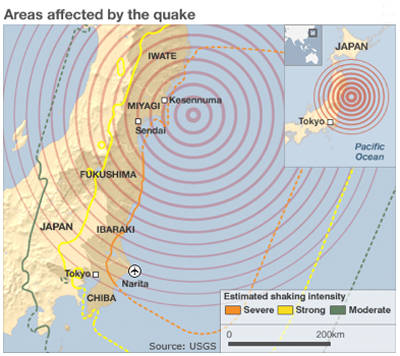UC Santa Cruz has prepared this page in an effort to keep members of the campus community informed about the crisis in Japan. This site also includes information on just a few of the relief organizations working in the country that can benefit from your support.
Organizations conducting relief efforts need support
A message from Chancellor Blumenthal points to a few of the many organizations that are actively involved in relief efforts — and are in need of support.
UC EAP has suspended its program
UC's Education Abroad Program has suspended its programs in Japan and students will be evacuated. Five UCSC students were participating in the Japanese EAP program at the time of the quake and tsunami; all five have been located and are safe. Four have returned to the United States.
Information from Santa Cruz Public Health Department
• UCSC Emergency Manager Chris Gaylord shares informational updates provided by the Santa Cruz County Public Health Department.
• UCSC's Environmental Health & Safety Office is recommending that members of the campus community visit the California Department of Public Health web site regularly for the latest information about radiation.
UCSC people help us understand the many dimensions of crisis
• Daniel Hirsch, a lecturer in nuclear policy affiliated with Colleges 9 and 10, was highly sought after for comments in the aftermath of the nuclear power plant crisis in Japan. CBS News online, MSNBC, the San Jose Mercury News, Christian Science Monitorand NBC Dateline were some of the media outlets that quoted him.
• Geophysicist Steven Ward was interviewed by KPIX TV (San Francisco) about the tsunami caused by the magnitude 8.9 earthquake that hit off the coast of Japan, and was also quoted in stories in the Sacramento Bee, Fresno Bee, AP, and Yahoo News.
• A UCSC graduate returned in January after 18 months in Japan, where she studied how Kobe recovered from the 6.8-magnitude earthquake that killed more than 6,400 people in January 1995. Her research focuses on disaster management information systems.
Travel advisories
• April 15, 2011: Given that the Department of State has lifted Voluntary Authorized Departure, allowing dependents of the U.S. government employees to return to Japan, travel restrictions to Japan have been lifted by the University and its insurance partners. Note that the Department of State recommends that U.S. citizens avoid travel within the 50-mile radius of the Fukushima Daiichi Nuclear Plant. U.S. citizens who are still within this radius should evacuate or shelter in place. Visit the Department of State Web site for more information.
• As always, be sure to register your travel — unless you have booked your travel through Connexxus, in which case you will be automatically enrolled. This will ensure that the University and our travel partners can provide you with information and services important to your security, health and safety, both before and during your travels. If you have any questions, please contact your local Risk Manager and/or Cheryl Lloyd at the Office of the President.



